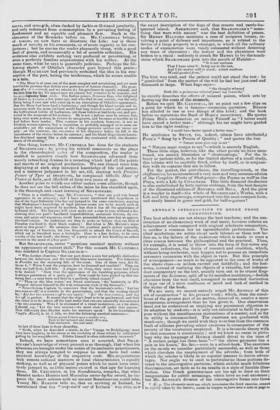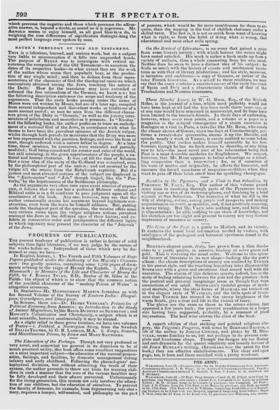ARNOLD'S INTRODUCTION TO GREEK PROSE COMPOSITION.
THE best scholars are not always the best teachers; and the con- struction of an elementary work of real merit, however inferior an achievement when compared with original scholastic composition, is neither a common nor an inconsiderable performance. The chief misfortune we notice about such labours as those now be- fore us, is the failure of the endeavour which is made to steer a clear course between the philosophical and the practical. Thus, for example, it is usual to throw into the form of foot-notes any abstract reelections, the fruits of research and erudition, which, without being irrelevant, may happen not to possess an immediate necessary connexion with the object in view. But this principle of arrangement—so much to be approved in the case of works of the above class—is seldom carried out faithfully ; and the foot- notes, instead of realizing the objects of a valuable, but indepen- dent commentary on the text, usually turn out to be truant frag- ments of the discourse, split off to its manifest mutilation,—foolish absentees from the text itself, consigned to unmerited distinction of type out of a mere confusion of mind and lack of method in the writer of the book.
We are sorry we cannot entirely acquit Mr. ARNOLD of this sin of construction* in his present work ; which, from the excel- lence of the greater part of its matter, deserved to receive a more perspicuous arrangement than he has given it. Our observation must not be understood as implying any paramount objection to its adoption by students—it is only not calculated to fulfil its pur- pose without the simultaneous instructions of a master, and so far its utility is circumscribed. The exercises are graduated with much care; though we could wish they were free from the common fault of silliness pervading school exercises in consequence of the poverty of the vocabulary employed. It is a favourite theory with us that nonsense is unnecessary ; and we know no cause in philo- logy why the language of HOMER should drivel to the tune of " A certain judge has three liens"—" the clever geometer has a pain in his knees," &c. &c.—even in a school-book. The exercises on the moods we consider particularly successful, as well as those which elucidate the employment of the adverbs ; from both of which the scholar is likely in an especial manner to derive advan-
tages. Nor ought we to omit to particularize those portions de- voted to the interrogative particles; which exhibit much felicitous
discrimination, set forth as to its results in a style of forcible illus- tration. Our Greek grammarians are too apt to draw on their imaginations for subtle meanings, which have no real existence; but Mr. ARNOLD'S division. of the interrogative forms into those " E. g. The idiomatic sentence which terminates the third exercise, cannot In rightly taken by the learner, unless he happen to„have seen a note in page 5.
which presume the negative and those which presume the affirm- ative answer, is, beyond a doubt, as sound as it is ingenious. Mr. ARNOLD seems to enjoy himself, as all good Grecians do, in weighing the nice differences of signification distinguishing the most perfect language ever spoken by man.



























 Previous page
Previous page